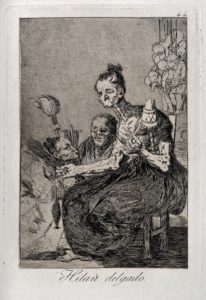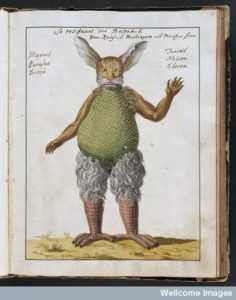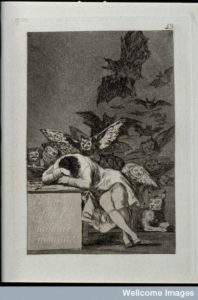Montague Bacon to Tublay – Ipswich aug 11, 1743
Item info
Date: Ipswich aug 11, 1743 Author: Montague Bacon Recipient: TublayLibrary: British Library, London Manuscript: MS 4066 Folio: f. 127-128
-
Language
English
-
Library
British Library, London
-
Categories
Social
-
Subjects
Cat, Hares, Levert, Travel Narratives
-
Date (as written)
Ipswich aug 11, 1743
-
Standardised date
-
Origin (as written)
Ipswich
-
Others mentioned
-
Patients mentioned
Original Page

Transcription
Sr Having a pretty deal of leisure, & it being a rainy day, I will afford the Club one letter more, to give some further account of my travels – To begin then, This country abound’s in Rye, Pease, & Hemp, feed; abundance of sheep, & produceth great store of Butter & Cheese. Thus say’s an Author, yt now he’s before me; But I hate to steal from other Travelers: So To come nearer [therefore] to the point, I saw yr Friend Capt. Brand last Friday at Ipswich; he went Both to the Plays He ask’d very kindly after you. He say’s Mr. Vernon will be back by Christmas. Mrs Vernon, I hear, hardly think’s her Husband will be able to live in that small House, He lived in before. They talk of making additions to it: but yet even then They expect to be but little there. Yr news papers talk much of ye King’s going abroad; but Ld Cart-t has assured his. Family, yt he know’s nothing of it. We don’t here beleive much of ye promotions of ye D. of Argyle – People come thick & threefold into ye Country, so London must be pretty desolate. My Lady Dysart told us one [very] extraordinary thing, vis. that her father had cast up his very minutely accounts, during the whole time, he was Ld. Lieutenant of Ireland; & yt He found at ye bottom of ye Acct., He was just 2000 l a loser – could you have beleived that? She heard him [attest?] it to be true. We have just received the news, yt Adm. Vernon has lost another son, yt was at school at Mr. Ray’s where the former died – This son dyed of a Fever. So that brave Admiral will enter his Country like Paulus Emilias wth the loss of his two Sons: had I hope, as in ye case of Paulas AE, His most obdurate enemies will have virtue enough to pity him heartily. We can make a shift to get the Pamphlets here, as well as at Chelsea: My Lady Dysart had the Ballad sent her by her Mother; who at the same time assured Her yt the story was literally true. Mr. Crawley say’s the same. This last Lady is just come down. We have had the answer to Cibber’s letter, & are to have more this week – Pray tell Sr. Hans, yt my brother has got a levert yt has been suckled & bred up by a cat – The cat & the Levert are as fond of one another, as can be. The Cat take’s it to be of her own kind, & sometimes bring’s live mice to it to teach it it’s own hare: and when she see’s, yt the Levert has no relish of ye employment, she boxe’s her ears for not learning her bus’ness, as she should do. I know not whether it be a curiosity to mention, yt our neighbor Mr. Crawley has a breed of white, quite white Game hares. The young ones are speckled, when young, but grow quite white, as they grow up. Sr. Hans can tell whether these things are worth mentioning or not. I conclude without any ceremony Sr Yr. humble Ser. M: Bacon I suppose Symons is back wth you by this time. Ipswich Aug. 11. 1743 For Captain Tublay At his House in Mannor Street In Great Chelsea Near London Montague Bacon Esq; of a Levert brought up by a cat Oct. 27. 1743 Copied & Sxd 20 AU
Montagu Bacon informs Captain Tublay that he recently saw his friend Capt. Brand at Ipswich. He also informs Captain Tublay that according to Capt. Brand, Mr. Vernon will be home by Christmas. Bacon notifies Captain Tublay that Adm. Vernon lost a second son to a fever while he was away at school. Bacon shares with Captain Tublay that his brother found “a levert yt has been suckled & bred up by a cat[.]” According to his account, the leveret and cat are very fond of one another. The cat treats the leveret as one of her own and even brings it live mice to eat. Bacon concludes by notifying Captain Tublay that his neighbor Mr. Crawley “has a breed of white … Game hares.” He provides a description of the hares, stating “[t]he young ones are speckled, when young, but grow quite white, as they grow up.” Montagu Bacon (1688-1749) was a clergyman of the Church of England and a writer (Arthur H. Grant, ‘Bacon, Montagu (1688–1749)’, rev. Philip Carter, Oxford Dictionary of National Biography, Oxford University Press, 2004; online edn, Oct 2007 [http://www.oxforddnb.com/view/article/997, accessed 12 May 2015]).
Patient Details
-
Patient info
Name: N/A
Gender:
Age: -
Description
-
Diagnosis
-
Treatment
Previous Treatment:
Ongoing Treatment:
Response: -
More information
-
Medical problem reference


